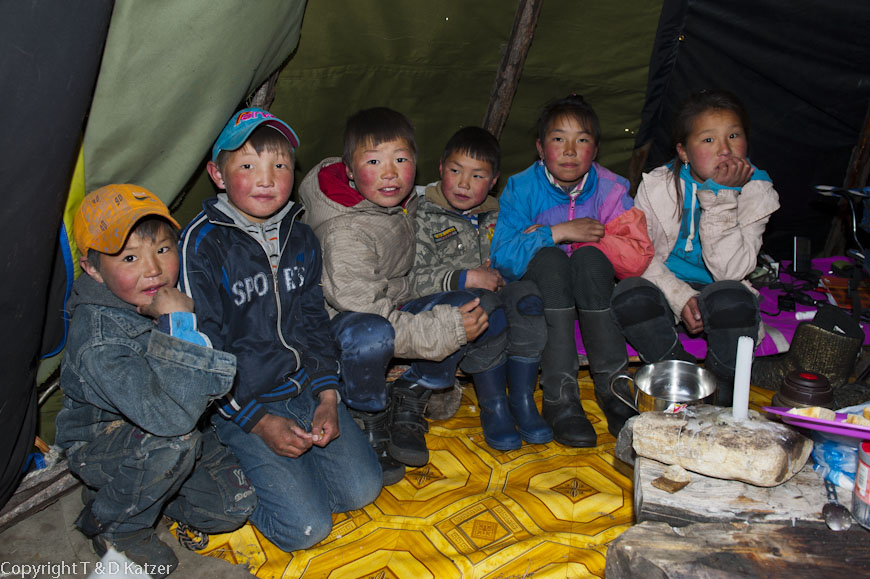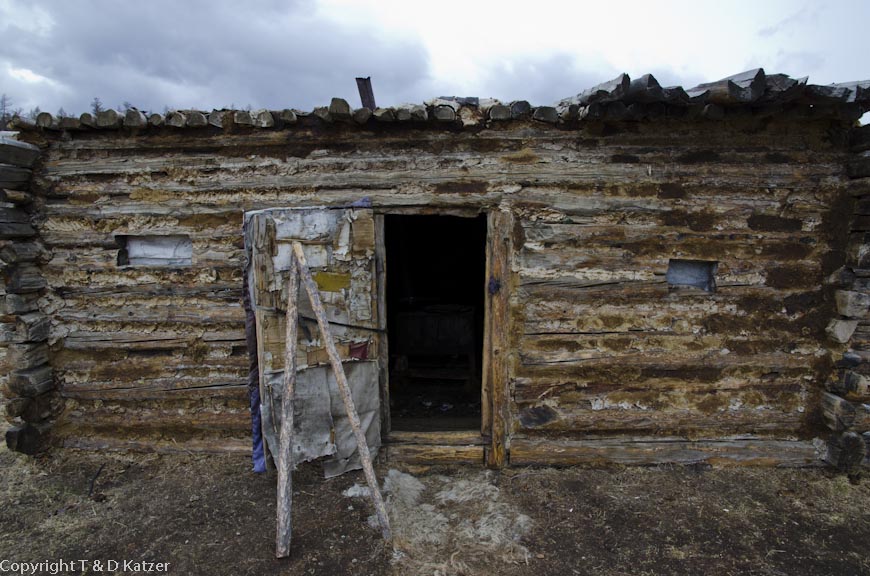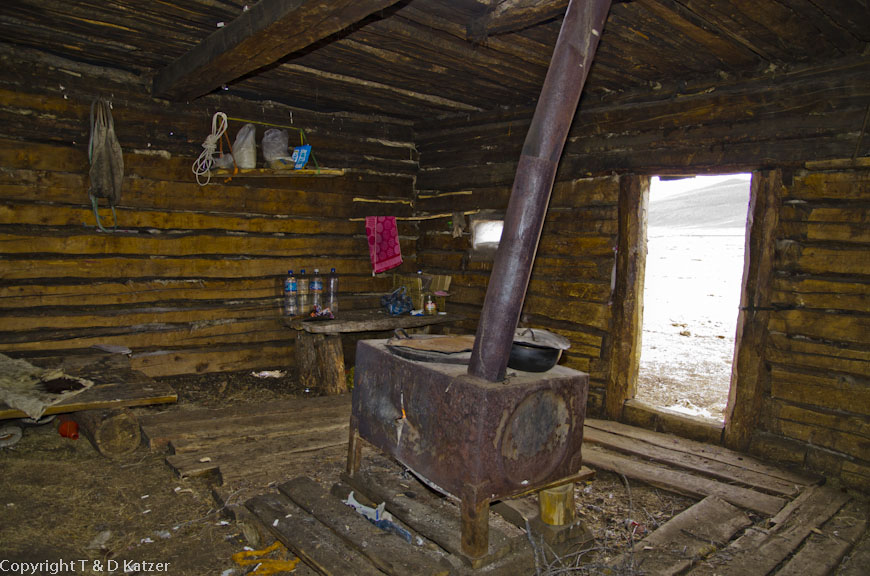
Organized crime – soon to be civil war? – Bilgee’s low
N 51°39'155'' E 099°21'977''
Day: 313
Sunrise:
05:09
Sunset:
21:30
Total kilometers:
1361
Soil condition:
Grass
Temperature – Day (maximum):
9°C
Temperature – day (minimum):
4°C
Temperature – Night:
minus 9°C
Latitude:
51°39’155”
Longitude:
099°21’977”
Maximum height:
1858 m above sea level



It is de facto difficult to start, carry out or continue such a journey without any plan. On the other hand, plans here seem to have only one purpose and that is to throw them overboard as soon as they have taken shape. For us Europeans, this incontrovertible fact is and remains a major challenge. There are only two alternatives, either you go crazy or you accept this yo-yo game with stoic composure. Mongolia could also be seen as a teacher. As always, it depends on the perspective. But no matter how I look at it, the challenge of traveling this country for 15 months, experiencing it in depth and not just biting the dust, is huge. Sometimes we think we have been defeated and are close to giving up. Then we recover, stretch and try to outwit any hurdles that arise with ideas and tricks. I’m sitting with Saraa in the tepee at Buyantogtoh. We ponder how to organize the visa extension. At the beginning of July, Saraa has to pick up two Hong Kong Chinese from Ulan Bator. That would be an opportunity to extend our visas. However, as it is not certain whether the tourists will fly on to Mörön, which would mean that Saraa’s flight to Ulan Bator would be invalid, we decide to unpack the last of our euros and pay for her flight to Ulan Bator. We give her €200 for the necessary documents and flight ticket, hoping that she will somehow manage to get the residence permit in time. If she doesn’t manage it, there is still the alternative of stabling the horses somewhere, traveling to Ulan Bator, getting on the train to Beijing and obtaining a normal tourist visa at the Mongolian embassy there. We would then have to have this extended by one month in Ulan Bator. A really elaborate and not exactly cheap variant, but feasible. The only question would then be whether our horses are still where we left them?
“I’ll do my best,” Saraa promises. “Good, we trust it,” I reply and hand her our passports and work permits. “What if we were to be checked during our journey?” I think aloud. “I’ll draw up a letter stating that your passports are currently in Ulan Bator for visa extension. To be on the safe side, I’ll add my signature and the stamp of our NGO. That should be enough,” she suggests. “I hope so. And how do we get hold of the wipe?” I ask. “I’ll send him to Tsendmaa. If you ride to Tsagaan Nuur, you can pick him up from her.” “A good plan. Let’s just hope something doesn’t come up again,” I say. “It will work out,” she says confidently. “Now we just need a replacement for Bilgee,” I continue. “Yes, that really is a problem. You shouldn’t be traveling alone in this country. The chances of getting your horses to Mörön are zero.” “You mean horse theft is that bad?” I ask. “It is extreme. This is organized crime. None of the tourists who are traveling without Mongolians keep their horses. They are stolen and then sold to other tourists. It’s a real business that some Mongolians make a living from. It’s bad but true. You need a horseman. Even then it is not certain that you will get through. You have now experienced for yourself how quickly you can lose a horse. And the thief didn’t shy away from stealing it from a Mongol. By which I mean that the Mongols also steal horses from each other. Apart from that, there are always cases of serious armed robbery. In such cases, the victim loses everything and is lucky if he keeps his underpants on,” she explains. “Yes, I know. Tsaya told me about a Mongolian who was attacked by three armed men and lost absolutely everything. They left the poor guy with nothing and he had to fight his way half-naked to the nearest yurt to get help,” I tell him. “Muu, muu”, (bad, bad) she says thoughtfully.
Civil war soon?
“I don’t understand your government. Why doesn’t it do something about it? Horse theft clearly harms tourism,” I say. “Our government is corrupt. It doesn’t spend money on that. Besides, our masters up there have other problems at the moment. There are elections in a few weeks. Some of us even believe a civil war is imminent. The population has long been very dissatisfied with their government and its corrupt politicians, and now prices are rising rapidly. Do you remember when I bought meat for you last November? A kilogram of beef cost between 3,700 (€2.11) and 4,000 tugrik. (€2.28) Today the price has risen to 10,000 tugrik (€5.71).” “It’s hard to believe. And that in a country where there are around 45 to 50 million farm animals for just under three million inhabitants? Who can still afford meat then?” I ask, shocked. “Yes, that’s the question. That’s also the reason why horses have become so expensive. When you bought your horses, you could get a good riding horse for 450,000 (257,- €) to 500,000 Tugrik. (286,- €) Now horses cost 800.000 to 850.000 Tugrik.” (457,- € to 486,- €) “What? That’s a fortune. Nobody can buy horses for that anymore.” “The rich can. And they are the ones who are getting richer.” “Now I really understand why horse theft has gotten out of control. Then the thief who stole Od collected a whopping 800,000 Tugrik plus a halter and a 10-meter rope. Because the average income hasn’t risen, he stole a fortune in minutes for which he would otherwise have had to work for almost five months,” I groan. “That’s right,” Saraa replies briefly.
“And how do we get hold of a reliable horseman now?” I change the unpleasant subject. “I have no idea. I’ll have a word with Naraa’s son. Maybe he’s interested in accompanying you.” “You mean your sister’s son?” “Yes.” “Oh, he’s a nice guy. We met him when we stayed at Naraa’s house last year.” “Yes, he’s nice, reliable and recently finished his studies. If he doesn’t want to or can’t, I have another young man in mind. He is also a close relative of mine and is a wrestler. He won the Nadaam in Mörön last year. He is currently working in construction. Maybe he’s ready for a change?” she ponders. “Fine, but how am I supposed to know if you can win the boys over for us or not?” “Call me on the seventh of June. I should know by then.” “On the seventh of June? We have no contact with the cell phone network from here,” I object. “You could climb the mountain. The Tuwa have told me that they can make phone calls from up there,” she says, pointing to the mountain that borders our camp to the south. “It’s a four-hour walk. If I climb up there, I have to be sure I can reach you. We should set a time,” I suggest. “What do you think about 5 p.m.?” “Okay, I’ll climb the mountain on June seventh and call you at 5:00. But please don’t forget me. It’s a long and tiring way for a phone call.” “I won’t forget you. By the way, if you like, I can take your equipment, which is stored at Ayush, to Mörön.” “Oh, that’s a good idea. I’ll just have to talk to Tanja to see if we need anything from it. If so, one of us should ride with you when you leave the spring camp. Then we could sort out the luggage and give you everything we no longer need,” I reply, pleased at the suggestion.
Bilgee’s low
As we discussed yesterday, Tanja rides off in the afternoon to ask Bilgee to dismantle his camp and drive the horses to the spring camp. In the meantime, I bake bread and write a few lines. Just 3 ½ hours later, Bilgee arrives at the camp. He greets me cautiously. I immediately notice his bad mood. When Tanja gets off the horse she says, “Please be nice to him. His mood is a disaster. At first he was happy about my visit but suddenly his mood changed. The horses were also unruly. All of a sudden Naraa turned around and everyone else followed. “Let go of stupid Mogi and put Naraa on the lead!” he suddenly shouted at me.” “What? He shouted at you?” I ask, startled, as I have come to know Bilgee as a calm person in almost every situation. “Yes, but please don’t say anything to him now.” “No, I’ll be nice to him,” I reply.
After we have unloaded the horses, Bilgee disappears, swearing quietly to himself. “He’s leaving us tomorrow, he said,” says Tanja. “Well, let him leave us then. I have no energy left for this terrible back and forth. We’ll find another solution,” I reply. “That’s what I think too. I don’t know what’s got into him,” Tanja ponders. “Well, we asked him to leave his self-chosen pasture and thus interfered in his area of responsibility. I thought it would provoke such a reaction,” I explain. “I told him that I would have to ride back to Tsagaan Nuur with you or me tomorrow to rearrange the equipment so that Saraa could take it back to Mörön. It bothered him that you or I would look after the horses in his absence. If that happens, I’ll leave immediately,” he said. “Is anyone supposed to understand this reaction? He’s going to leave us soon anyway. Then we’ll be forced to look after the horses without him,” I say angrily. “I think he’s missing a few synapses.” “You mean he’s not all there?” I ask. “His reaction is not normal, to say the least.” “He’s lost his nerve. The loss of Od is obviously bothering him more than we thought. It’s about the honor of the horse herder. That seems to have been badly damaged,” I suspect.
Suddenly we hear loud bickering which the wind carries over to us from Buyantogtoh’s tepee. “No wonder they stole your horse. The place where you were is very bad! Besides, the food here is much better than there!” Delimuren’s voice can be heard. “The grass here is brown and dead. There it’s fresh and green,” Bilgee defends himself loudly. “This grass here is brown but full of vitamins. It has been preserved by snow and ice over the winter. At your pasture, it is eaten by cattle throughout the winter. The fresh grass has no quality and is no good for such emaciated horses as yours,” counters the horse woman Delimuren. “You have no idea!” Bilgee retorts and storms off, swearing.
When he is back with us in the tipi, we calm him down and try to build up his sense of honor. “Don’t worry about other people’s words. You know there’s a lot of talk here. You can’t help the horse theft. It has happened. What can you do about it? Nothing. Who knows what it was good for? Now sit down and have a cup of tea,” we say to him. I touch him gently on the shoulder and say, “You’re a good horse man. We are aware of that. We have decided not to ride to Tsagaan Nuur tomorrow. Saraa is to take all the equipment stored at Ayush. We should be able to manage with the equipment we have here in the tipi. Tanja or I only wanted to ride along to take anything we might need out of the duffel bags. She packed well when you were there but didn’t expect Saraa to come and transport everything to Mörön. We’ll manage. We also decided to set off on the eighth of June. So two days earlier than planned. If we go on foot, it won’t be a problem to bring out the equipment we have here, despite the lack of Od and weak horses,” I say. Bilgee’s facial features smooth out.
“Should we unpack a bottle of vodka and celebrate his birthday?” asks Tanja. “Can’t hurt,” I reply. As soon as the bottle is on the table, the rest of Bilgee’s anger is gone. He laughs. The fact that we took his side despite the horse theft obviously makes him feel good. According to local custom, I bless the bottle. Bilgee takes on the important task of serving. Tanja places the brandy chocolates on the small wooden table I made for her, which she bought especially for this occasion during her last stay in Tsagaan Nuur. Then she prepares us a noodle soup with elk meat, which I got from Ultsan today. Nothing more is heard about Bilgee’s journey home tomorrow. “Tanja?” says Bilgee suddenly. “Sorry,” he apologizes for his bad behaviour in the afternoon. “It’s already forgotten,” she replies with a friendly smile. In a harmonious mood and slightly buzzed from the vodka, we get into our sleeping bags at 1:00 am. “Tanja, Denis?” “Yes?” “Sleep well,” Bilgee says in German. “Sleep well Bilgee,” we reply.
We look forward to your comments!

